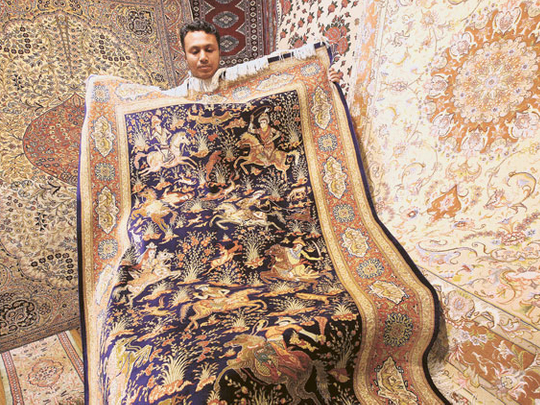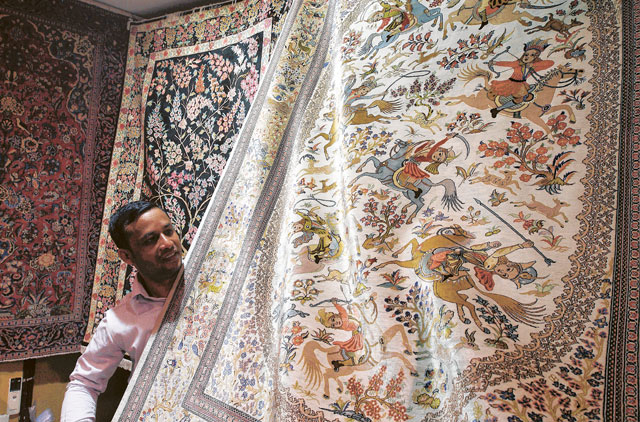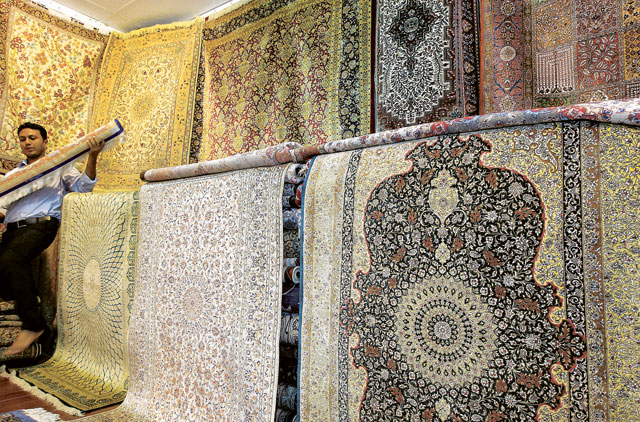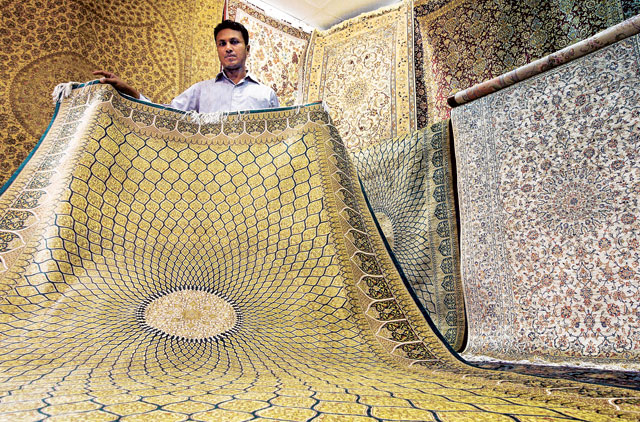
Sharjah: UN sanctions on Iran are making it more difficult for Sharjah carpet sellers to import Persian rugs — leading to a doubling of prices and up to an 80 per cent drop in sales.
Carpet sellers say that American tourists are also reluctant to buy carpets to take home because of a ban on importing rugs to the US.
"Before [the sanctions], carpets were available. But now they are difficult to get and the prices are higher in Iran," said Fairouz, a salesman at the Persian Carpet House and Antiques in Sharjah's Blue Souq.
"Before the sanctions, American tourists bought most of our carpets but now they don't buy. Because of the sanctions, they are afraid to take them home."
The tightening sanctions on Iran by the UN Security Council over its nuclear programme means choking of business for local carpet sellers and higher prices for customers.
"We don't bring in new supplies. We used to bring in big containers but now we order [only] a few pieces," Fairouz said, referring to his company's 28 shops in Sharjah, Dubai and Abu Dhabi. "There are no customers, it's very bad now. We used to sell [carpets for] Dh1 million a month, now it's Dh4,000 or Dh5,000.
"There is no margin, nobody is buying … business is stopped like this," he said. "Business stopped but we are still paying rent in Dubai. It is expensive even if the rent goes down."
Business has been slow for a couple of years when the sanctions really hit the carpet market, retailers said, with sales dropping by 50 to 80 per cent.
Asked if some of his shops will close, Fairouz said: "We don't know yet, if business [continues] like this, God knows what will happen."
When contacted by Gulf News, the Sharjah Chamber of Commerce and Industry (SCCI) said it was not aware of the difficulties carpet retailers are facing.
International law
"The UAE follows the UN approved laws. We as a country abide by international law regarding Iran and other countries. Carpets are one thing that Iran itself is sensitive in exporting. Iran does not allow its exit if it's very precious," said Hussain Al Mahmoudi, director-general of SCCI.
"Whenever you have international sanctions, you should expect some sort of challenges. Traders have other options as well. There are Afghan and Turkish carpets. It's exaggerated, you see Iranian rugs everywhere in the UAE, they're available."
He advised retailers to verify the duties to pay on carpets with the Customs Department. "If they come to us, we can do that for them."
Other carpet sellers mentioned another reason for their poor business.
Many Iranian families involved in making Persian carpets are abandoning their craft and turning to more lucrative jobs in manufacturing or agriculture, the sellers said.
It takes from six months to two years to make a silk carpet.
"There are fewer labourers… we used to go buy from families who weaved carpets and used to have about 5,000 labourers. Now, there's just 500 and they can't pay them," said Ahmad Abdullah, manager of Persian Carpet Kingdom that has four stores in Sharjah. With fewer weavers available to make the coveted carpets, the lack of supply is forcing prices to double, retailers said.
"In Iran the cost has increased. I used to buy a medium carpet for Dh10,000 and now it's become double or more," Abdullah said, predicting that prices will continue to increase.
Craft in decline
The decline of this ancient craft in Iran, and the US sanctions on the business, means more pressure on its economy.
The export of hand-woven carpets generates about $500 million (Dh1.83 billion) annually for Iran's economy, with 20 per cent of the total earned in the US market, according to a Bloomberg report citing a Persian carpet think-tank.
Some local retailers are selling cheaper and inferior quality Afghan and Pakistani carpets as a Persian product, making a profit from the difference in cost, said Mohammad Hussain, a salesman at Kashan Carpet, warning customers to beware.
The slow season of Ramadan and summer is no easy ride for local carpet-sellers either.
"The market is stagnant and sales drop 70 or 80 per cent in Ramadan and summer. It is a dead season, there are no tourists in summer," said Adel Al Azraq, sales manager at Esfahan Exhibition.
In one shop, fine Persian carpets line the walls and floor.
Hunting scenes with men bearing horns and galloping after gazelles leap from a pink and cream silk rug made in Qom, a city 140km south of Tehran, renowned for its weaving. "The Iranian art is disappearing. There will be a time when you won't find excellent quality Persian carpets. You can't compare them with the Afghan ones," said Rashad Al Gazzali, manager of Sheba Iranian Carpets.
Trade
- Iran-UAE trade ties rose steadily throughout the last decade, by most estimates peaking at some $12 billion in 2007.
- Countries such as China — whose commercial and energy relations with Iran are estimated to be upward of $15 billion — have begun to conduct much of their bilateral trade with Iran through the emirates.
- The overwhelming majority of UAE trade with Iran involves the simple re-export of goods received from other countries, ranging from everyday foodstuffs to industrial equipment. This re-export trade has grown steadily over the past decade and was officially worth over $8.5 billion in 2010, though unofficial estimates are much higher.
- Iran is the UAE's second-largest re-export market, accounting for about 17 per cent of total re-export volume, and the UAE in turn is one of Iran's top sources of imports, accounting for more than 15 per cent of its total. As a result, the trade relationship is heavily weighted in the UAE's favour.
- In 2010, the UAE exported or re-exported over $9 billion worth of goods to Iran, and only imported $1.12 billion worth. Iran's trade deficit with the UAE is its largest.
- Iran was Sharjah's second-most important export partner in 2009, with re-exports worth more than $780 million in 2009.
— Source: The Battle of Dubai: The United Arab Emirates and the US-Iran Cold War, by Karim Sadjadpour, Carnegie Endowment for International Peace.















